Zhengyang Wang
Muon+: Towards Better Muon via One Additional Normalization Step
Feb 26, 2026Abstract:The Muon optimizer has demonstrated promising performance in pre-training large language models through gradient (or momentum) orthogonalization. In this work, we propose a simple yet effective enhancement to Muon, namely Muon+, which introduces an additional normalization step after orthogonalization. We demonstrate the effectiveness of Muon+ through extensive pre-training experiments across a wide range of model scales and architectures. Our evaluation includes GPT-style models ranging from 130M to 774M parameters and LLaMA-style models ranging from 60M to 1B parameters. We comprehensively evaluate the effectiveness of Muon+ in the compute-optimal training regime and further extend the token-to-parameter (T2P) ratio to an industrial level of $\approx 200$. Experimental results show that Muon+ provides a consistent boost on training and validation perplexity over Muon. We provide our code here: https://github.com/K1seki221/MuonPlus.
Beyond Parameter Arithmetic: Sparse Complementary Fusion for Distribution-Aware Model Merging
Feb 12, 2026Abstract:Model merging has emerged as a promising paradigm for composing the capabilities of large language models by directly operating in weight space, enabling the integration of specialized models without costly retraining. However, existing merging methods largely rely on parameter-space heuristics, which often introduce severe interference, leading to degraded generalization and unstable generation behaviors such as repetition and incoherent outputs. In this work, we propose Sparse Complementary Fusion with reverse KL (SCF-RKL), a novel model merging framework that explicitly controls functional interference through sparse, distribution-aware updates. Instead of assuming linear additivity in parameter space, SCF-RKL measures the functional divergence between models using reverse Kullback-Leibler divergence and selectively incorporates complementary parameters. This mode-seeking, sparsity-inducing design effectively preserves stable representations while integrating new capabilities. We evaluate SCF-RKL across a wide range of model scales and architectures, covering both reasoning-focused and instruction-tuned models. Extensive experiments on 24 benchmarks spanning advanced reasoning, general reasoning and knowledge, instruction following, and safety demonstrate, vision classification that SCF-RKL consistently outperforms existing model merging methods while maintaining strong generalization and generation stability.
HeaPA: Difficulty-Aware Heap Sampling and On-Policy Query Augmentation for LLM Reinforcement Learning
Jan 30, 2026Abstract:RLVR is now a standard way to train LLMs on reasoning tasks with verifiable outcomes, but when rollout generation dominates the cost, efficiency depends heavily on which prompts you sample and when. In practice, prompt pools are often static or only loosely tied to the model's learning progress, so uniform sampling can't keep up with the shifting capability frontier and ends up wasting rollouts on prompts that are already solved or still out of reach. Existing approaches improve efficiency through filtering, curricula, adaptive rollout allocation, or teacher guidance, but they typically assume a fixed pool-which makes it hard to support stable on-policy pool growth-or they add extra teacher cost and latency. We introduce HeaPA (Heap Sampling and On-Policy Query Augmentation), which maintains a bounded, evolving pool, tracks the frontier using heap-based boundary sampling, expands the pool via on-policy augmentation with lightweight asynchronous validation, and stabilizes correlated queries through topology-aware re-estimation of pool statistics and controlled reinsertion. Across two training corpora, two training recipes, and seven benchmarks, HeaPA consistently improves accuracy and reaches target performance with fewer computations while keeping wall-clock time comparable. Our analyses suggest these gains come from frontier-focused sampling and on-policy pool growth, with the benefits becoming larger as model scale increases. Our code is available at https://github.com/horizon-rl/HeaPA.
TEON: Tensorized Orthonormalization Beyond Layer-Wise Muon for Large Language Model Pre-Training
Jan 30, 2026Abstract:The Muon optimizer has demonstrated strong empirical performance in pre-training large language models by performing matrix-level gradient (or momentum) orthogonalization in each layer independently. In this work, we propose TEON, a principled generalization of Muon that extends orthogonalization beyond individual layers by modeling the gradients of a neural network as a structured higher-order tensor. We present TEON's improved convergence guarantee over layer-wise Muon, and further develop a practical instantiation of TEON based on the theoretical analysis with corresponding ablation. We evaluate our approach on two widely adopted architectures: GPT-style models, ranging from 130M to 774M parameters, and LLaMA-style models, ranging from 60M to 1B parameters. Experimental results show that TEON consistently improves training and validation perplexity across model scales and exhibits strong robustness under various approximate SVD schemes.
Sketch-Based Facade Renovation With Generative AI: A Streamlined Framework for Bypassing As-Built Modelling in Industrial Adaptive Reuse
Jan 13, 2026Abstract:Facade renovation offers a more sustainable alternative to full demolition, yet producing design proposals that preserve existing structures while expressing new intent remains challenging. Current workflows typically require detailed as-built modelling before design, which is time-consuming, labour-intensive, and often involves repeated revisions. To solve this issue, we propose a three-stage framework combining generative artificial intelligence (AI) and vision-language models (VLM) that directly processes rough structural sketch and textual descriptions to produce consistent renovation proposals. First, the input sketch is used by a fine-tuned VLM model to predict bounding boxes specifying where modifications are needed and which components should be added. Next, a stable diffusion model generates detailed sketches of new elements, which are merged with the original outline through a generative inpainting pipeline. Finally, ControlNet is employed to refine the result into a photorealistic image. Experiments on datasets and real industrial buildings indicate that the proposed framework can generate renovation proposals that preserve the original structure while improving facade detail quality. This approach effectively bypasses the need for detailed as-built modelling, enabling architects to rapidly explore design alternatives, iterate on early-stage concepts, and communicate renovation intentions with greater clarity.
BOOST: BOttleneck-Optimized Scalable Training Framework for Low-Rank Large Language Models
Dec 13, 2025

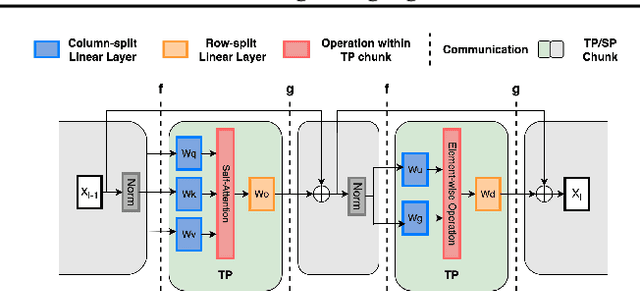
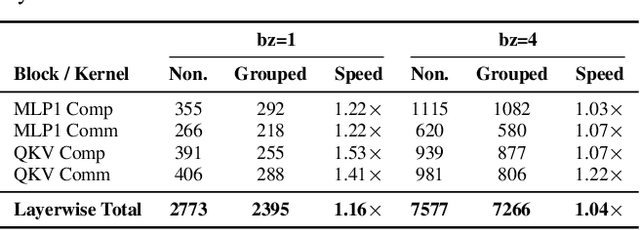
Abstract:The scale of transformer model pre-training is constrained by the increasing computation and communication cost. Low-rank bottleneck architectures offer a promising solution to significantly reduce the training time and memory footprint with minimum impact on accuracy. Despite algorithmic efficiency, bottleneck architectures scale poorly under standard tensor parallelism. Simply applying 3D parallelism designed for full-rank methods leads to excessive communication and poor GPU utilization. To address this limitation, we propose BOOST, an efficient training framework tailored for large-scale low-rank bottleneck architectures. BOOST introduces a novel Bottleneck-aware Tensor Parallelism, and combines optimizations such as online-RMSNorm, linear layer grouping, and low-rank activation checkpointing to achieve end-to-end training speedup. Evaluations on different low-rank bottleneck architectures demonstrate that BOOST achieves 1.46-1.91$\times$ speedup over full-rank model baselines and 1.87-2.27$\times$ speedup over low-rank model with naively integrated 3D parallelism, with improved GPU utilization and reduced communication overhead.
SkipKV: Selective Skipping of KV Generation and Storage for Efficient Inference with Large Reasoning Models
Dec 08, 2025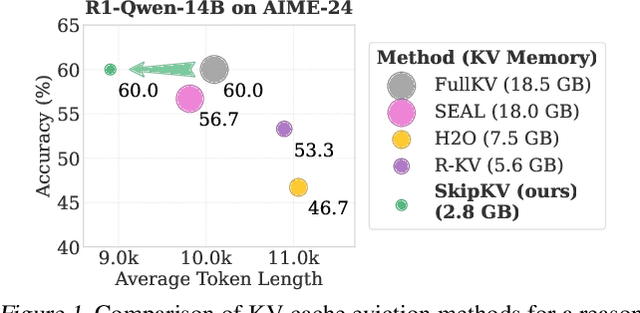
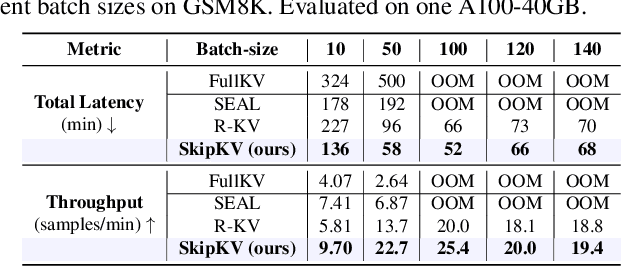

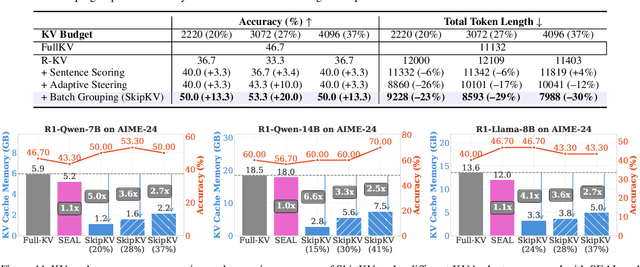
Abstract:Large reasoning models (LRMs) often cost significant key-value (KV) cache overhead, due to their linear growth with the verbose chain-of-thought (CoT) reasoning process. This costs both memory and throughput bottleneck limiting their efficient deployment. Towards reducing KV cache size during inference, we first investigate the effectiveness of existing KV cache eviction methods for CoT reasoning. Interestingly, we find that due to unstable token-wise scoring and the reduced effective KV budget caused by padding tokens, state-of-the-art (SoTA) eviction methods fail to maintain accuracy in the multi-batch setting. Additionally, these methods often generate longer sequences than the original model, as semantic-unaware token-wise eviction leads to repeated revalidation during reasoning. To address these issues, we present \textbf{SkipKV}, a \textbf{\textit{training-free}} KV compression method for selective \textit{eviction} and \textit{generation} operating at a coarse-grained sentence-level sequence removal for efficient CoT reasoning. In specific, it introduces a \textit{sentence-scoring metric} to identify and remove highly similar sentences while maintaining semantic coherence. To suppress redundant generation, SkipKV dynamically adjusts a steering vector to update the hidden activation states during inference enforcing the LRM to generate concise response. Extensive evaluations on multiple reasoning benchmarks demonstrate the effectiveness of SkipKV in maintaining up to $\mathbf{26.7}\%$ improved accuracy compared to the alternatives, at a similar compression budget. Additionally, compared to SoTA, SkipKV yields up to $\mathbf{1.6}\times$ fewer generation length while improving throughput up to $\mathbf{1.7}\times$.
RecGPT Technical Report
Jul 30, 2025



Abstract:Recommender systems are among the most impactful applications of artificial intelligence, serving as critical infrastructure connecting users, merchants, and platforms. However, most current industrial systems remain heavily reliant on historical co-occurrence patterns and log-fitting objectives, i.e., optimizing for past user interactions without explicitly modeling user intent. This log-fitting approach often leads to overfitting to narrow historical preferences, failing to capture users' evolving and latent interests. As a result, it reinforces filter bubbles and long-tail phenomena, ultimately harming user experience and threatening the sustainability of the whole recommendation ecosystem. To address these challenges, we rethink the overall design paradigm of recommender systems and propose RecGPT, a next-generation framework that places user intent at the center of the recommendation pipeline. By integrating large language models (LLMs) into key stages of user interest mining, item retrieval, and explanation generation, RecGPT transforms log-fitting recommendation into an intent-centric process. To effectively align general-purpose LLMs to the above domain-specific recommendation tasks at scale, RecGPT incorporates a multi-stage training paradigm, which integrates reasoning-enhanced pre-alignment and self-training evolution, guided by a Human-LLM cooperative judge system. Currently, RecGPT has been fully deployed on the Taobao App. Online experiments demonstrate that RecGPT achieves consistent performance gains across stakeholders: users benefit from increased content diversity and satisfaction, merchants and the platform gain greater exposure and conversions. These comprehensive improvement results across all stakeholders validates that LLM-driven, intent-centric design can foster a more sustainable and mutually beneficial recommendation ecosystem.
UniConv: Unifying Retrieval and Response Generation for Large Language Models in Conversations
Jul 09, 2025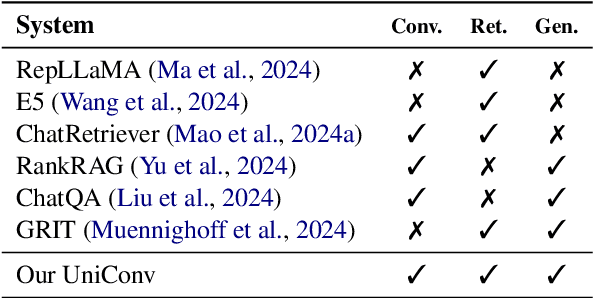
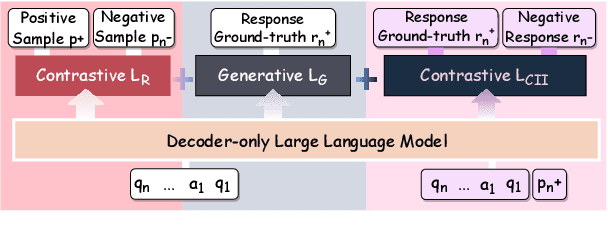
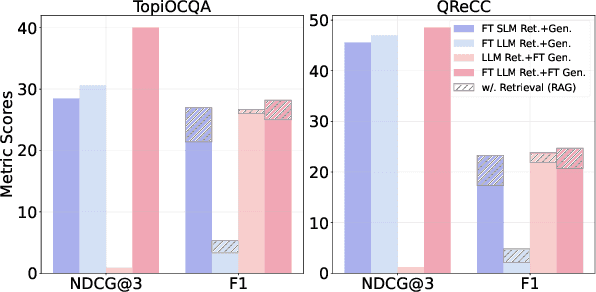
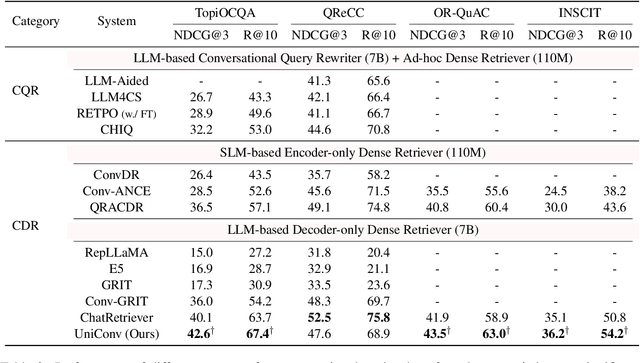
Abstract:The rapid advancement of conversational search systems revolutionizes how information is accessed by enabling the multi-turn interaction between the user and the system. Existing conversational search systems are usually built with two different models. This separation restricts the system from leveraging the intrinsic knowledge of the models simultaneously, which cannot ensure the effectiveness of retrieval benefiting the generation. The existing studies for developing unified models cannot fully address the aspects of understanding conversational context, managing retrieval independently, and generating responses. In this paper, we explore how to unify dense retrieval and response generation for large language models in conversation. We conduct joint fine-tuning with different objectives and design two mechanisms to reduce the inconsistency risks while mitigating data discrepancy. The evaluations on five conversational search datasets demonstrate that our unified model can mutually improve both tasks and outperform the existing baselines.
PersonaAgent: When Large Language Model Agents Meet Personalization at Test Time
Jun 06, 2025Abstract:Large Language Model (LLM) empowered agents have recently emerged as advanced paradigms that exhibit impressive capabilities in a wide range of domains and tasks. Despite their potential, current LLM agents often adopt a one-size-fits-all approach, lacking the flexibility to respond to users' varying needs and preferences. This limitation motivates us to develop PersonaAgent, the first personalized LLM agent framework designed to address versatile personalization tasks. Specifically, PersonaAgent integrates two complementary components - a personalized memory module that includes episodic and semantic memory mechanisms; a personalized action module that enables the agent to perform tool actions tailored to the user. At the core, the persona (defined as unique system prompt for each user) functions as an intermediary: it leverages insights from personalized memory to control agent actions, while the outcomes of these actions in turn refine the memory. Based on the framework, we propose a test-time user-preference alignment strategy that simulate the latest n interactions to optimize the persona prompt, ensuring real-time user preference alignment through textual loss feedback between simulated and ground-truth responses. Experimental evaluations demonstrate that PersonaAgent significantly outperforms other baseline methods by not only personalizing the action space effectively but also scaling during test-time real-world applications. These results underscore the feasibility and potential of our approach in delivering tailored, dynamic user experiences.
 Add to Chrome
Add to Chrome Add to Firefox
Add to Firefox Add to Edge
Add to Edge